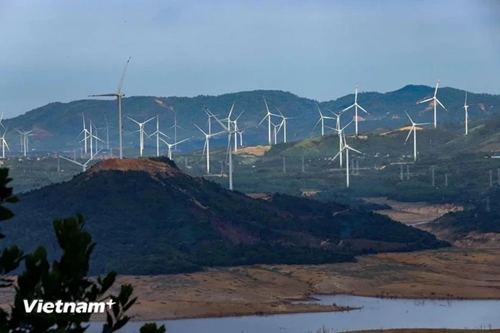The country has completely phased out the consumption of chlorofluorocarbons (CFCs), halon, and carbon tetrachloride (CTC) since January 1, 2010; and HCFC-141b, a substance used in foam production, since January 1, 2015.
It has participated in the Vienna Convention for the Protection of the Ozone Layer and the Montreal Protocol on Substances that Deplete the Ozone Layer since 1994.
Dr. Tang The Cuong from the MoNRE’s Department of Climate Change stated that Vietnam's efforts in implementing the Vienna Convention and the Montreal Protocol over the past 30 years have been recognized and highly praised by the international community.
    |
 |
|
Vietnam develops wind power plants. |
The country has made significant progress in ozone layer protection by establishing management regulations and implementing them in practice. To date, the commitment to ozone protection has been institutionalized and integrated into domestic law through the 2020 Law on Environmental Protection and its detailed implementation regulations.
To implement the law, the Government issued Decree No.06/2022/ND-CP dated January 7, 2022, which outlines measures for mitigating greenhouse gas emissions and protecting the ozone layer; and Decree No.45/2022/ND-CP dated July 7, 2022, specifying penalties for administrative violations in the field of environmental protection, along with numerous related circulars by the Ministry of Natural Resources and Environment.
To implement measures concertedly from now by 2045, on June 11 this year, the Prime Minister issued a national plan on the management and elimination of ozone-depleting substances, under which Vietnam will promote the transition to technologies that utilize substances with low or zero global warming potential, and roll out sustainable cooling solutions to cut emissions by 11.2 million tons of CO2 equivalent by 2045.
The plan aims at effectively managing and gradually eliminating the substances in line with the Montreal Protocol.
Accordingly, the country will honor the commitment on being free of products that contain or are made from bromochloromethane, carbon tetrachloride (CTC), CFC, Halon, HBFC, methyl chloroform, and HCFC 141b, and will not import other HCFCs from 2040.
As planned, it will cut the consumption of HFCs, and phase down the substance’s consumption to 20% from 2045.
Furthermore, the controlled substances will be collected, kept, transported, and recycled in accordance with technical requirements. Meanwhile, mechanisms on carbon credit generation from recycling and treatment of the substances will be popularized.
Regarding sustainable cooling solutions, they should be integrated into the national- and provincial- levels urban area development programs, action plans in response to climate change, and relevant planning.
In response to the International Day for the Preservation of the Ozone Layer 2024 and the 30th anniversary of Vietnam's participation in the Vienna Convention and the Montreal Protocol, the ministry is organizing a wide range of activities to raise public awareness of this field, including hosting workshops, producing reports, and arranging events with students.
Source: VNA